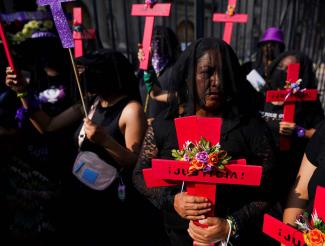Domestic violence
An invisible war against women

In 2020, some 47,000 women and girls were killed by their partners or other family members worldwide, according to the United Nations Office on Drugs and Crime (UNODC). A World Health Organization (WHO) report showed, moreover, that one in three women are subjected to physical or sexual violence in their lifetime. Often, the perpetrators are intimate partners.
These numbers show that not only war and strife have a devastating impact on women’s lives. They indicate that a war on women is being waged in their homes and in their most private space. The full devastation is not documented, but the number of victims is similar to that of armed conflicts.
Women are abused everywhere in the world
A World Bank report has confirmed that 35 % of all women experience one of these forms of violence.
It happens in all cultures, regardless of religion or GDP. Certainly, there are places where patriarchal structures are still more pronounced, and women are at greater risk in war than in peacetime. But women are abused, and their rights are violated daily all over the world. It happens in the USA, Germany and Colombia, as well as in Myanmar, Nigeria and Afghanistan.
This reality must not be ignored. Sex education must teach teenagers how to prevent sexualised violence, how to respond to it and how to engage in relationships without violence. Governments and civil society have a duty to take action. Without sustainable gender justice in all social spheres, including the most private ones, the 5th UN Sustainable Development Goal – gender equality – cannot be achieved.
Chilean feminists made a song a few years ago called “El violador eres tú” (You are the rapist). It is usually mistranslated as “A rapist on your way”, possibly to dilute the harsh indictment of society.
Their song started with this verse:
“Patriarchy is a judge
That judges us for being born
And our punishment
Is the violence that you don’t [want to] see”
Fabio Andrés Díaz Pabón is a research fellow on Sustainable Development and the African 2063 agenda, hosted by the African Centre of Excellence for Inequality Research (ACEIR) of the University of Cape Town.
fabioandres.diazpabon@uct.ac.za













